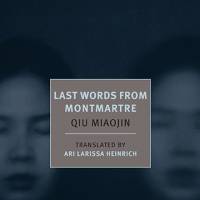Qiu Miaojin tells us that her novel features "a plot that has long since disappeared." That these reflections on narrative are part of "Last Words," the novel they serve to elucidate, and that they are apt, places Qiu's novel squarely at the avant-garde end of the literary spectrum. As such, it will not be for everyone. It will, however, be very much for those who are avid for the enduring pleasure a novelist gives when she offers something more than a book with which to kill a couple hours.
Last Words from Montmartre, by Qiu Miaojin
Translated by Ari Larissa Heinrich.
New York Review Books, Fiction.
Instead, this is a book about how love, passion and life can lead one to kill oneself, as Qiu's protagonist seems likely to do at the novel's end, and as Qiu herself did a year after she moved from her birthplace, Taiwan, to Paris to do graduate work.
It is not clear whether Qiu's life and death can be mapped onto that of the woman who writes the letters of which the novel is composed, but it is refreshing that, though Qiu's protagonist is, like herself, a lesbian, it is not lesbianism and society's sometimes unkind reaction to it that leads to the protagonist's suicide, but rather passion unrequited, frustration at not being lovable enough. Qiu, in Ari Larissa Heinrich's fluent translation, makes this agony art.

















With your current subscription plan you can comment on stories. However, before writing your first comment, please create a display name in the Profile section of your subscriber account page.